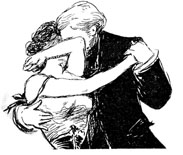
Prostitutes in Portsmouth?
Crispian Hollis, the Catholic Bishop of Portsmouth, England, wants to legalize brothels. But, says Bishop Hollis, “that’s not to say that I approve of prostitution in any way.” Really? Prostitution, Bishop Hollis says, is going to be with us “whatever we do and it has been from time immemorial. So I think that is something we have to be realistic about.” Rachel Frost of the International Union of Sex Workers praised Bishop Hollis: “The bishop should be commended for having the guts to come out and say that” (Reuters, Nov. 8, 2007).
Does Bishop Hollis have “guts”? No. He’s just blowing with the wind of the “Spirit of the Age.”
Bishop Hollis said of prostitution, “I think there’s a need to make sure it’s as well-regulated as possible for the health of the people involved…. [But] I do regard those involved in any way as involved in some form of immorality” (Catholic News Service, Nov. 8, 2007). Some form of immorality? Try lust, fornication, Onanism — sins against chastity. The Catechism says prostitution is “always gravely sinful” (#2355). Apparently, Bishop Hollis is more concerned about ensuring the temporal, physical health of grave sinners, and enabling their sin, than he is about securing their eternal, spiritual health by calling on them to repent and turn away from sin.
In his book The Roman Option (1997), William Oddie, an Englishman and a former Anglican vicar turned Catholic layman, said Bishop Hollis is sympathetic to the feminist agenda and hostile to opponents of priestesses.
You May Also Enjoy
The average Catholic will ask himself, “What can I and my parish do for economic justice? How should my spiritual life affect my social behavior and my habits of consumption?”
Bishop Crispian Hollis wants to legalize brothels. But, says Bishop Hollis, "that's not to say that I approve of prostitution."
The tradition of Catholic social teaching has roots in Abraham, Moses, the prophets, and in the very life and message of Jesus himself.

